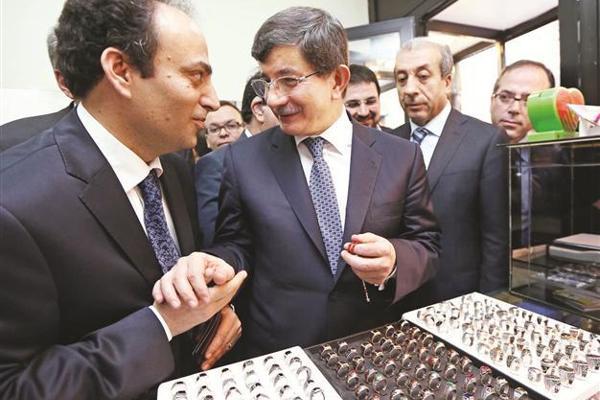Peace in Turkey ‘will be model for Mideast’
DİYARBAKIR - Hürriyet Daily News


Foreign Minister Ahmet Davutoğlu (R) and Diyarbakır Mayor Osman Baydemir (L) are seen at a jewelry store in Diyarbakır during the minister’s visit. AA photo
The Middle East will witness a “domino effect” of peace if Turkey can successfully solve its Kurdish issue, Foreign Minister Ahmet Davutoğlu said March 15 during a trip to the southeastern province of Diyarbakır.“[Turkey] will be a light of hope for Syrians, Tunisians, Egyptians, Libyans, and Yemenis who take Turkey as a model and who asks for the same in their countries,” Davutoğlu told reporters.
Davutoğlu also noted his optimism for the upcoming celebrations of Nevruz, a regional spring festival that is hugely important to Kurds. “I can see that his Nevruz will maybe be the most enthusiastic one in the last 30 years. God willing, it will be celebrated in peace all around the country. It will be a day our citizens of all roots, all regions will sing and dance together.”
He also said members of the Cabinet might even celebrate the holiday, but added that the prime minister would make the final decision.
The minister expressed his hope for permanent peace following his observation of “hope” in Diyarbakır, saying, “This is not just a matter of Turkey.”
The minister, however, noted the imperative of solving the issue. “We will walk together with Turks, Kurds, Bosniaks and Arabs, or they will try to tear us to shreds and split us into small pieces,” Davutoğlu said as he addressed a conference at Dicle University.
In line with the ongoing resolution process that the government has undertaken, the theme of “brotherhood” dominated his speech at the university, as he maintained that the citizenship definition in Turkey had no discriminative element.
“Now it’s time to bring out a new political understanding from that togetherness,” he said.
Humanity needs a huge restoration as the international order has deteriorated because the world has lost its ability to react to international crises, he said.
The Middle East is also in a restoration process, the minister said, identifying this process as the “closure of a century’s parenthesis.”
Noting that Turkey was also in a restoration process, he said: “No color, language and cultural element will be excluded through this restoration process. We are of the same breed with those who share the same history. This is the main component of our foreign policy.”
Citizenship is a matter of law for the government, the minister said, adding that “a citizen, coming from whichever religion, sect and race is an equal citizen.”
What is needed is to build a connection between contemporary citizenship and joint historical roots, Davutoğlu said.
Agriculture Minister Mehdi Eker, Deputy Agriculture Minister Kutbettin Arzu and several Diyarbakır deputies of the ruling Justice and Development Party (AKP) accompanied Davutoğlu during his Diyarbakır visit, where the ministers also attended a meeting of the AKP’s provincial body.
Davutoğlu and Eker visited historical ruins in the city and met with shopkeepers in the city, who welcomed the visiting minister with cheering. Diyarbakır Mayor Osman Baydemir accompanied the ministers during his visits to the downtown and also went to Ulu Cami together for Friday prayers.
The current peace process would build “peace bridges” between the people of the region and pave the way for them live together in peace, Baydemir said during the government delegation’s visit to the mayor’s office. “I hope we’ll open a new page,” the mayor said.
For his part, Davutoğlu said nobody should let some circles drive a wedge between the peoples of Turkey.
On the first day of his visit, Davutoğlu met with members of rights groups and NGOs in Diyarbakır, Mardin and Batman at a dinner late on March 14.
The civic society representatives also expressed their criticisms over the handling of Uludere incident, in which 34 villagers were killed in an air strike on Dec. 28, 2011.
“The reflex of protecting the state should be left and a new approach should be created” that would positively help local people, he said.
Some of the NGOs also opposed the imprisonment of elected deputies.
The foreign minister is further expected to visit the southern province of Mersin and the southeastern province of Şanlıurfa next week.
